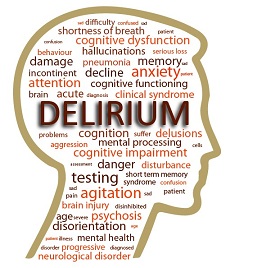Delirium-An Indicator Of COVID-19 In Older And Frail Individuals According To King’s College London Study
Source: Delirium-COVID-19 Oct 01, 2020 4 years, 6 months, 3 weeks, 3 days, 22 hours, 58 minutes ago
Delirium-COVID-19: A new study by researchers from King's College London involving detailed meta-analysis of data and information procured from the COVID Symptom Study app and patients admitted to St Thomas' Hospital in London, has shown that delirium, a state of acute confusion associated with a higher risk of serious illness and death is a key symptom of COVID-19 in frail, older individuals.

The research findings were published in the journal Age and Ageing which is a peer reviewed publication.
https://academic.oup.com/ageing/advance-article/doi/10.1093/ageing/afaa223/5912424
The research findings highlight that physicians and carers should be aware of delirium as a possible early warning sign of COVID-19 in the elderly, even in the absence of more typical symptoms such as cough or fever.
The way that the SARS-CoV-2 coronavirus causes Delirium is still unknown. A number of other coronaviruses have shown significant neurotropism in animal models it is plausible that SARS-CoV-2 displays this property. Indeed, SARS-CoV-2 was found in cerebrospinal fluid of a reported case of COVID-19 encephalitis in Beijing. Different mechanisms have been proposed to explain neurological involvement in COVID-19. The virus could reach the CNS via a compromised blood-brain barrier, or migrate via neuronal pathways, infecting peripheral sensory or motor nerve endings, leading to subsequent neurological damage and neuroinflammation. Some authors have proposed that angiotensin-converting enzyme 2 (ACE2), identified as the functional receptor for SARS-CoV-2 and expressed in the brain, could play a role in mediating the inflammatory response in COVID-19 infection.
The study led by clinical fellow and geriatrician Dr Rose Penfold at King's College London, analyzed data from two groups of older people aged 65 or over from March through May. The first group included 322 patients admitted to hospital with COVID-19 who had tested positive for COVID-19, while the second comprised 535 users of the COVID Symptom Study app who reported having had a positive test result.
The study team found that older adults admitted to hospital who were classified as frail according to a standard scale were more likely to have had delirium as one of their symptoms than individuals of the same age who were not classed as frail.
Delirium, along with tiredness and breathlessness, were also more common in frailer users of the COVID Symptom Study app with COVID-19, compared with fitter people of the same age.
Interestingly it was found that a third of app users experiencing delirium did not report suffering the 'classic' COVID-19 symptoms of cough and fever, while delirium was the only symptom for around one in five (18.9%) of hospitalized patients.
For the study, frailty in the group of hospitalized patients was measured using the Clinical Frailty Scale (CFS) test, which is administered by a doctor. COVID Symptom Study App users were asked to complete a short questionnaire asking about their health, which is comparable to the CFS.
The research would be the first showing that delirium is a likely symptom of COVID-19 in frail older adults
, although the precise biological connection between the two conditions still needs to be understood.
The study findings also highlight the need for systematic assessment of frailty for older people, along with awareness and screening for delirium for this vulnerable population in hospitals, care homes and the community.
"Older, frailer individuals are at greater risk from COVID-19 than those who are fitter, and our results show that delirium is a key symptom in this group. Doctors and carers should watch out for any changes in mental state in elderly people, such as confusion or strange behavior, and be alert to the fact that this could be an early sign of coronavirus infection," commented Dr Penfold.
Co researcher, Dr Claire Steves from King's College London added, "The past six months have shown us that COVID-19 can spread catastrophically through care homes. Knowing that delirium is a symptom in frail, elderly people will help families and carers spot the signs earlier of COVID-19 and act appropriately and put in place infection control measures such as isolation, increased hygiene and personal protective equipment to protect this highly vulnerable group."
Professor of Genetic Epidemiology at King's College London and COVID Symptom Study lead, Dr Tim Spector further added, “In April we upgraded the COVID Symptom Study app to allow users to log health reports on behalf of friends and family who aren't able to access the app. This significantly increased the number of older people in the study, providing vital insights. We're hugely grateful to all our users and urge everyone to download the app and log their health and that of their loved ones on a daily basis as we move towards the winter months."
The study team concluded, “This is the first study demonstrating higher prevalence of probable delirium as a COVID-19 symptom in older adults with frailty compared to other older adults. This emphasizes need for systematic frailty assessment and screening for delirium in acutely ill older patients in hospital and community settings. Clinicians should suspect COVID-19 in frail adults with delirium.”
For more on
Delirium-COVID-19, keep on logging to Thailand Medical News
